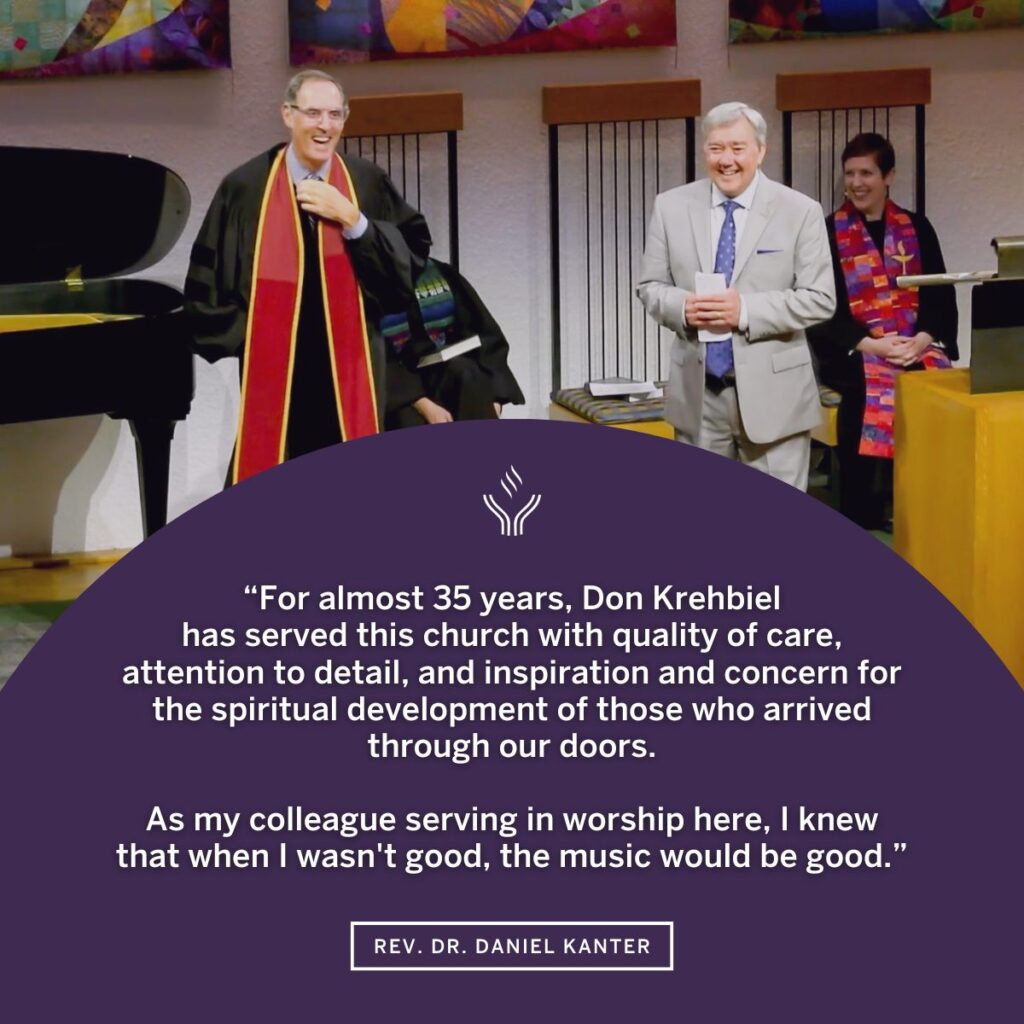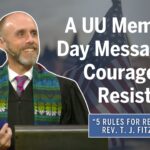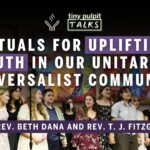Beyond Words | Rev. Dr. Daniel Kanter | 05.05.24


Sermon Transcript
Those Beethoven lines of his fifth symphony in C minor, they stand out in all our minds. Whether we learn them listening to that in the symphony hall or watching Bugs Bunny, they’re there deep in us. Why? It’s just notes. It’s musical notes, made up by human ingenuity and craftsmanship and imagination, but lodged so deep in our brains. We can hum it in church with a lousy conductor or on our death beds, I’m sure.
“Music is the moral law,” said Plato in the fourth century BCE. “It gives soul to the universe, wings to the mind, flight to the imagination, and charm and gaiety to life and to everything.” Another musical philosopher said, “One good thing about music, when it hits, you feel no pain.” Am I telling the truth there?
The power of musical memory
The notes of so many songs are lodged in us, deeply lodged in us because they bypass the rational mind to the deep recesses of the soul. It is so powerful, this memory, this musical memory, that somehow it survives the ravages of disease and the moments of our lives, the highs and the lows. Even in people with advanced dementia, music can often reawaken personal memories and associations that otherwise would be lost.
I remember very clearly the times my grandfather, who was a brilliant man, a full doctor by age 21, who grew up making wine with his Italian father and family and listening to Italian operas. Once he had a stroke in his eighties, he became from one of the most sharp and witty people I knew to a person struggling with words just to ask for what he wanted.
And I remember one time my brother and I had taken him to a cafe somewhere, I don’t remember, just that it was a busy city street. We struggled to talk through anything substantial. The frustration on his face was tangible. When my brother said to him, “Can you sing the aria from Tosca?”, my grandfather started to sing. [foreign language 00:03:57]. And the stars were shining and it smelled the earth. My Italian’s terrible, by the way. [foreign language 00:04:14].
He continued in full voice, the people around us stopping to listen. We were in shock and amazement that our grandfather, who could not ask for a spoon to stir his coffee, was singing full-throated and on-key in Italian. The words the door to the garden squeaks and a step grazed the sand she entered. We were weeping as he finished “And I have never loved life so much,” the lyrics said. [foreign language 00:04:56], so much life. Tanto la Vita, the music of his childhood spilling out into the streets and into our lives.
He died soon after that at his home, surrounded by all of us. My first son reaching for his hand and he reaching back. And I want to say that we played that aria as we sat together after the coroner removed his body. But I can’t know for sure. Because time warped for me that day the way that time warps when you lose a big presence in your life. You feel life shifting in strange ways in those moments.
Don Krehbiel’s Legacy at First Unitarian Church of Dallas
I feel like that a little today with Don Krehbiel leaving. He has been the music director for all the time that I have been here and Cynthia by his side. I have heard so many notes and pieces and songs and plan with him and change plans with him and brainstormed worship and more. The notes of his piano have played above my office ceiling for the last 13 years. I could hear him practicing every piece that’s been played here.
I’m so sad to see Don go, but I also know that like good music, his effect is in us. Next time I hear U2’s MLK I will picture Don in that corner of the choir loft singing it out. And anytime I hear a piece by Eric Whitaker, who wrote the piece I asked the choirs to sing at my installation, I’ll remember the literal feeling of the church lifting while they sang it and time-warping. As they put that piece of music, I thank you God for most this amazing day, into the world. I thank the Don for making that moment happen, one that set us on the path that we have been on for all these years.
Rabbi Joshua Heschel said, “Listening to great music is a shattering experience, throwing the soul into an encounter that undermines conceit and complacency and may even induce a sense of contrition.” The rabbi knew music. He knew the prayerful music sung in sorrowful moments in his life and the joyful moments of victory. He knew also the quiet and the majestic, and he knew that music changes us. He knew, like we know, the importance of church musicians to faith communities.
From an old article from the Organist magazine I found in my files, I don’t know why I had that in my office, but I did in my office, filed under music. I read these words from this article from I think the sixties or fifties. It said, “The role of the church musician is to aid in the deconstruction of oppressive beliefs by throwing the soul into an encounter with an aspect of reality to which the mind can never relate itself adequately. Restoring us from idolization, leading us to encounter the mystery that is expressed and evoked by music.” Now, I noted it didn’t mention the role of clergy in doing that, although, let’s be honest, a magazine forum by organists would say that.
But what we know is that Don has fostered all these things here in this sanctuary. For almost 35 years, he served this church with quality care of attention to detail and inspiration and concern for the spiritual development of those who arrived through our doors. As my colleague serving in worship here, I know and I knew that when I wasn’t good, the music would be good. And I observed Don, thank you for helping my humble moment. We’ll be discussing your pledge later. I don’t know who it was. I’m just teasing you.
But it is true. It is true. I knew that it was going to be good and as my colleague here, I observed Don as a person. He brought his whole self to the task joyfully, and sometimes his wanting to get it perfect and right, got him a little agitated. We should admit, right? Perfectionism may be a quality of a music director. The quality though was and is important, and there have been sublime space and time, bending moments Don led here. He has nourished the souls of those who came to worship and be held by music that at times was more important than words.
The ministry of music
In this way, the ministry of the music has been so important. It has led us to encounter the mystery that is expressed and evoked by music in ways that we can’t with language.
I want you to think of a time when music, any music has been important to you. A specific moment, a moment that might’ve happened here in this church or in a concert or at your bedside, or in a moment of joy or despair. Whatever it is, it is important because the deep recesses of the soul needed it. A folk song, a clarinet solo, a choir chant, chorale or hymn and aria, the soul needs it because it is like spirit unworded, nurturing the heart of the matter of being alive. And we have been blessed to foster it here so many times that moment. And friends, I want to assure you that we will continue to do so for a very long time from today onward.
Because here in this church, music has a ministry. Has a ministry. In the book, The Time of our Singing, by Richard Powers, a powerful story about how singing saves lives. There’s a moment described by the main character of singing in a choir. Powers writes this. He writes, “Six voices now repeating and reworking, each peeling off on its own agenda. Syncopated, staggered yet each with an eye on the other mid-air acrobats. Not one of them wavering, no one crashing against the host of moving targets. This stripped down simple sing-song blooms like a firework peony. Everywhere in the awakened air, in a shower of staggered entrances, I hear the first phrase, keyed up, melted down and rebuilt. Harmonies pile up, disintegrate and reassemble elsewhere. Each melody praising God in its own fashion, and everywhere combining to something that sounds to me like freedom.”
Don and the musicians of our church have been fostering moments like that, which sound like freedom for many years. And for that, we are grateful. Dom’s legacy will continue his names on the wall, by the way, and his name’s in us. And we need to give him time to figure out who he is outside this job. That’s what retirement is. Give him a little distance and little rest. And we send him off today to celebrate the great effect he’s had on all of us. And we will continue here in this church with great moments, because this church is strong and lives for the transformation of everyone who comes through the doors, by the words spoken here or many times by things that aren’t words at all.
We thank the choirs and Alan and Cynthia and all who have sustained music in this place and will in the future. Because we know the grace of God is in part the grace received by things we can hardly describe. Sounds that soar in us and through us in joy and in moments of challenge lifting us up with the feeling of freedom. For that grace, we live and honor all who have fostered it. Amen.







